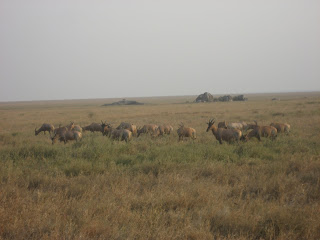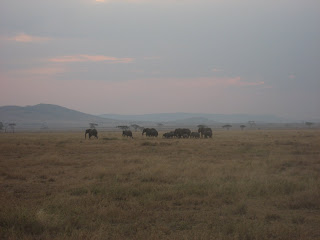Things I will NOT miss:
Carbohydrates.
Even though I walk upwards of 3 miles a day around here, I would bet money that I have gained weight. A typical day consists of toast for breakfast, being starving by midday, eating loads of carbs for lunch because you’re so hungry, being starving by dinner, and eating another carb meal then. I would pay millions for a salad or even something cold. Gazpacho anyone? Attention.
I miss being invisible. It is impossible to walk down the street here without everyone saying something, whether it’s a simple greeting, some inappropriate comment, or a marriage proposal (of which we’ve all had too many to count). Even little kids run up to us to practice their English, and then we have to engage in small talk with them. I’m sorry cute children, but it’s been a long day and I just want to get home!
On the same note: I will not miss the word "mzungu". It means white person, and while it's not derogatory in the least, it's a little tiring hearing it every time you walk past someone. Basically, now I know they're talking about me, but I still don't know what they're saying.
Bartering.
While its fun in a sense, and you can get things for really cheap – it’s exhausting! Sometimes I overpay just to get it over with. Please, just tell me what your lowest price is an let’s call it a day. This is how a typical bartering conversation goes: First I walk through the market and each person tries to get me in their stall:
Them: Mambo, Karibu (How are you, Welcome) – as they try to pull me into their store.
Me: Hapana, asante (No, thank you) – as I run away.
This happens at every stall I pass (upwards of twenty before I find something that may have what I want.
Finally, I find a stall that looks like it may have the mask I want.
Me: Bei gani? (How much?) – holding up a mask
Them: Arobaini (forty)
Me: Hapana, kumi na tano (no, fifteen)
Them: No, rafiki (friend) this is too low, just give me a better price.
Meanwhile, I’m pissed that they switch in an out of Swahili.
Me: No, rafiki, you give me a lower price.
Them: Thelathini na tisa.
Me: You just dropped it by one thousand. I will give you twenty and that’s it.
Them: Ishirini?! (Twenty?!) That price is too low, rafiki, I no make money. You kill me.
Me: Yes you will, you buy these things very cheap.
Them: How about you give me forty thousand for that mask and also these bracelets?
Me: I don’t want those bracelets.
Them: I give you very good price. Very low. Here look at them.
Me: I don’t want these bracelets.
Them: Keep looking, find something else you want.
Me: Hmm, this necklace is very pretty, I will give you twenty five for the mask and two necklaces.
Them: No, your price is too low.
Me: Sorry, that’s my final offer.
Them: Just give me thirty five, this is a very good price.
Me: No thanks, I’ll look somewhere else.
This is when I proceed to walk out the door.
Them: Wait, rafiki, I give you a very good price. Thirty-three.
Me: No thank you. Have a good day.
Them: Okay, you have have your price, thirty thousand.
Me: That isn’t my price. I said twenty five.
Them: Twenty five?! That’s a very low price. Just come up a little bit. Give me a fair price.
Me: No thank you. Have a good day.
Then at the next stand I walk in and start all over. Except, this lady starts the mask at twenty thousand only, and I end up getting it for thirteen. This whole process has taken me over an hour.
Bottled water.
Having to buy water each day is a pain in the ass. My entire day revolves around when I will pick up water and how heavy it will be to carry home.
5am prayer call.
I can't describe the sound or the content, but suffice it to say that it starts at 5am, lasts 45 minutes and is broadcast over a loudspeaker.
Things I WILL miss.
Mama Mary and Ana.
They're what makes my home here seem like home.
Avocado.
At home, avocado is 2 for $5.00. Here, 4 avocados are 1500 Tsh, the equivalent of a dollar. Also, it's the only cold, raw thing to eat here. Quiet time.
At Mama Mary’s we have no TV and we have to be home by 6:45 when it gets dark. So basically, we have an entire evening of quiet time to read and relax. I will miss this. Walking.
I know I can do this at home, but here it’s just the way you get everywhere. I walk at least three miles a day on a normal day, others much more. It’s nice to know that something is counteracting the carbs. New people.
Not saying that I don't like my old people, but it’s really fun to be meeting so many new people each day. Every time we go out to do something or meet for lunch, there are new volunteers there. They're from all over the world and it's just a good experience. The clothes.
The women here wear the most amazing outfits. They buy material of African patterns from the market and then take it to a tailor to have them make custom outfits that usually consist of at least 4 to 5 pieces. When I’m riding the dala, I just look out the window at all the beautiful skirts, dresses and headpieces. Would I personally wear all of it at home? No. Although, I have had two skirts, two pairs of pants, and a purse made (for under $30 total).
My orphanage.
What can I even say? The kids are adorable, I get to learn more Swahili and I am doing something good. Also, did I say the kids are cute?
Cool at night and in the morning - hot and sunny during the day. What more could you want? Well, except for some personal hygiene to counteract the hot days...
And a few things I hate some days and love on others...
Arusha.
Like any town/city, the energy is contagious. I can walk everywhere and the markets are exciting and fun. People are everywhere selling everything you could think of. Popular items include used socks and shoes (usually left by safari-goers), peeled oranges, shelled peanuts, dusty lollipops, corn (already cooked and on a stick like a corn dog), and pants (also used). However, I'm a little tired of being hit by cars and also having to check for my wallet each time I get stuck in a crowd and bump into someone. It's exciting, but tiring having to be so alert at all times. I miss the days where I can amble down an actual sidewalk daydreaming.
Daladalas.
I have always loved public transportation. It's the one time in a day where you can just sit and relax and nothing is expected of you. I have a 45 minute ride each way to work, and part of me loves it. However, I am not a fan of packing 20+ people into a small van, or the fact that drivers get in physical fights with each other to get you on their ride. One volunteer sat next to a woman who proceeded to open up a big tub, and in it was a dead cow, chopped up to fit in the tub. Yes, this type of thing is normal here. Dead animals on public transportation. But, riding it makes me feel like I belong here. It's an achievement (and maybe a miracle) each day when I get on the right one, make it to work, and arrive home in the afternoon. The first day I rode the dala to work and back alone was the first day I knew for sure I could do this whole thing. The dala holds a special place in my heart.
Swahili.
I love learning a new language, and Swahili itself is relatively easy (at least at the level I need it) and a beautiful language to listen to. Unlike English, each letter always sounds the same. So, as long as someone can spell a new Swahili word for me, I can say it. I know enough Swahili in a classroom setting to get by, but outside the orphanage I'm hopeless.
So far, the single most frustrating moment of this whole trip has been trying to get a poster tube from UPS so I could send paintings home. It consisted of drawing and pantomime, and involved 4 different Swahili-speaking UPS people. In the end, one guy got this enlightened look on his face, rattled of something in Swahili, asked me for 5000 Tsh ($3.50) (in Swahili) and disappeared. After 45 minutes I went to leave (without my money), and the other three people pantomimed me to sit down. Then, the guy returned with exactly what I wanted (?!). I have no clue what the final straw of success was, but it was the hour of frustration preceding that which I can't forget.
And today, I went to pick up two purses I had made (Kim, pay attention - this affects you). Let's just say that the two meters I gave her for two purses turned into one purse. One big purse. So when I meant mbili (two) purses, she understood mbili-meter purse. Oh well. At least I have an extra piece of luggage.


















































